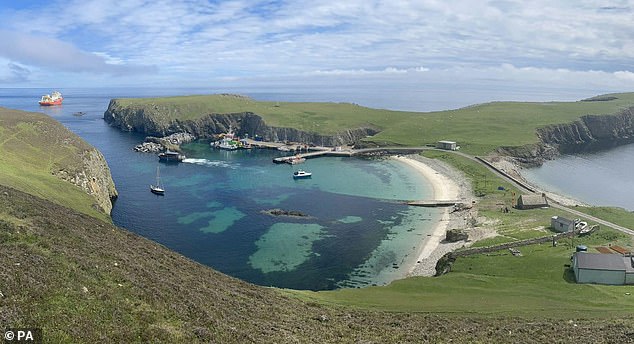[ad_1]
Health chiefs are attempting to lure nurses to work on the UK’s most remote island—with the promise of up to £50,000.
In an effort to recruit a nurse to the idyllic Scottish spot of Fair Isle, the successful candidate will also be offered £10,000 worth of allowances and a car.
NHS Shetland bosses have aimed the tempting deal at a full-time resident nurse who wants to be part of an island with a ‘truly welcoming atmosphere’ and ‘resilient community’.
Fair Isle, which measures just three miles long by one-and-a-half miles wide, lies halfway between Shetland and Orkney Islands and boasts a population of just 50 residents.
The successful applicant will be expected to provide personal care in the absence of any social care provision on the island.
Under the lucrative offer, the nurse will be paid between £41,608 and £50,702.
Health officials are also offering an annual ‘distant island allowance’ of £2,482 per year, as well as up to £8,000 to relocation expenses.
A car will be provided and a two-bedroom traditional stone-built house will also be available for the nurse to rent.

In an effort to recruit a nurse to the idyllic Scottish spot of Fair Isle, the successful candidate will also be offered an £10,000 worth of allowances and a car
NHS Shetland, which is spearheading the recruitment drive, said: ‘Fair Isle is a wonderful place to live and work, offering low pollution, low crime, excellent schools, great leisure facilities, unique wildlife and amazing scenery, whilst still only a short flight away from the UK mainland.
One resident, Eileen Thomson, grew up on Fair Isle, and moved back to the island from Edinburgh with her young family eight years ago.
‘On Fair Isle, you get to be so much more of a nurse than you would anywhere else,’ she said.
‘On the mainland, you might see a patient for five minutes, and not see them again for months, or even ever.
‘But here, the nurse gets to really look after people.
‘You get that continuity of care living and working alongside people, and you get that chance to look after your flock—it’s a wonderful opportunity for someone.’
A key quality to living and working on the island, she said, was being able to throw yourself into its ‘vibrant’ community.
‘We need people who are going to work hard and get on,’ she said.

NHS Shetland bosses have aimed the tempting deal at a full-time resident nurse who wants to be part of an island with a ‘truly welcoming atmosphere’ and ‘resilient community’

Fair Isle, which measures just three miles long by one-and-a-half miles wide, lies halfway between Shetland and Orkney Islands and boasts a population of just 50 residents
‘If anyone wants solitude and isolation, they’re better off living in a city.
‘On Fair Isle, we need people to chip in, who can help out, and who want to be sociable, because that’s how we all thrive.’
The island, owned by the National Trust for Scotland since 1954, has had a resident nurse since 1903.
Until then, those on Fair Isle had to rely on a community medicine chest.
In June, a £5.6 million contract was awarded to a Yorkshire firm to build a new roll-on, roll-off ferry for Fair Isle, expected to come into service next year.
It comes as the future of nursing in the UK and in the NHS has been under the spotlight for the last two years.
Historic strike action has already seen NHS nurses take to the picket lines in England in a dispute over pay.
The campaign saw claims that NHS nurses were leaving the profession for less demanding roles in supermarkets for equal or better pay than what they received in the health service.
While the dispute has been formally resolved after an RCN ballot to continue the action failed, union officials have continually hinted that NHS nurses pay is still not enough to encourage people to join the profession and further action will be considered.
In March, an alarming investigation also revealed that thousands of patients were being put at risk of harm by a severe shortage of NHS nurses.
At least a third of hospitals routinely have dangerously large gaps in their rotas, with baby and critical care units worst hit, the probe by Channel 4 found.
[ad_2]
This article was originally published by a www.dailymail.co.uk . Read the Original article here. .

